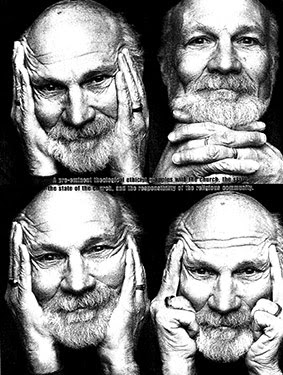Lately, I’ve been noticing subtle differences between the popular ‘spirituality vs. religion’ and ‘faith vs. religion'
 Some prefer ‘spirituality’ because it only implies one’s own spiritual self or soul (sans any god at all). So hiking the mountains is ‘spiritual’ because it nurtures the soul. True enough. However, I personally prefer to speak of ‘faith’ because my spiritual self or my soul has been freed and fed by a Love greater than my own … and indeed, faith freed me from religion in a way that spirituality hadn’t. As one Orthodox priest says, ‘Religion is a neurological disease and faith is its cure.’
Some prefer ‘spirituality’ because it only implies one’s own spiritual self or soul (sans any god at all). So hiking the mountains is ‘spiritual’ because it nurtures the soul. True enough. However, I personally prefer to speak of ‘faith’ because my spiritual self or my soul has been freed and fed by a Love greater than my own … and indeed, faith freed me from religion in a way that spirituality hadn’t. As one Orthodox priest says, ‘Religion is a neurological disease and faith is its cure.’I’m also conscious that there can be positive takes on ‘religion’ -- as in the encyclical of St James, where it amounts to practices of compassion and empathy). Religion in that passage is more a neutral word for 'faith practices' but only IF one adds the right adjective. And so when we critique 'religion,' we typically attach negative adjectives, such as ‘toxic’ or ‘moralistic’ religion.
Many such adjectives exist, but I’m starting to think that some of them actually hide the real problem of toxic religion in a sneaky way. For example, we often castigate ‘organized religion.’ But is the problem that it’s organized? Some faith communities are simply organized enough to gather and become a safe place from spiritual abuse or religious domination. And being 'disorganized' would be of no advantage to such dangers.
Other times we critique ‘hierarchical’ religion … I must say that hierarchy can be and has been the venue for all types of brutality. But so has anarchy. In fact, at times the ‘hierarchy’ in my faith tradition has been the main instrument protecting me from spiritual abuse, rather than afflicting it. I would say the limited 'hierarchy' of some 'organizations' makes them safe and also efficient. For example, my experience of PTM.org, which champions 'Christianity without the religion,' is that it has a clear structure with a caring and non-controlling 'chain of command' ... Greg Albrecht is a real leader (no anarchy there) and Laura Urista is a brilliant manager (no disorganization there) BUT they cannot be charged with 'religion.' So structure or lack of it may or may not be a problem, but fixating on that may also mask the real and deeper insidious side of religion when things have gone awry.
 So the trickier question is what real toxins might lurk behind our secondary misplaced adjectives of organization or hierarchy?
So the trickier question is what real toxins might lurk behind our secondary misplaced adjectives of organization or hierarchy?












